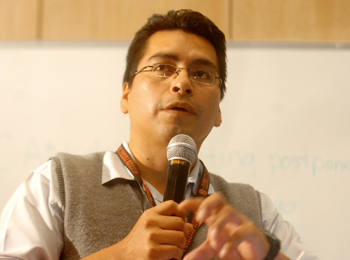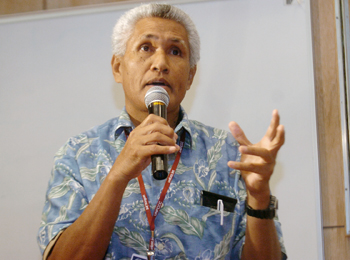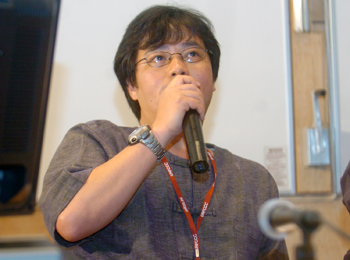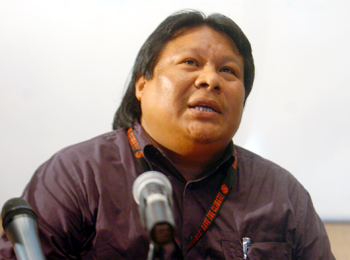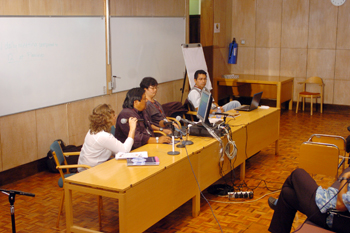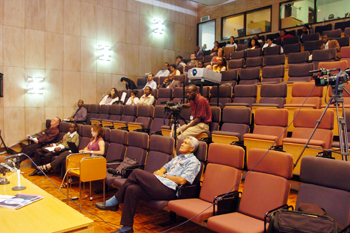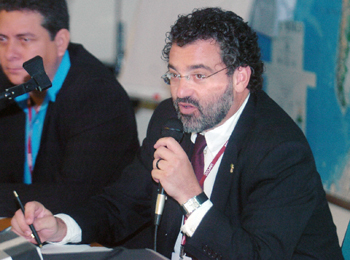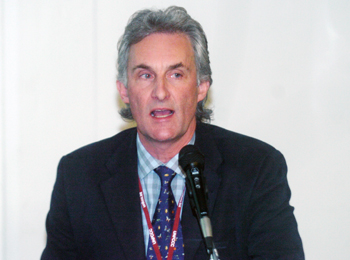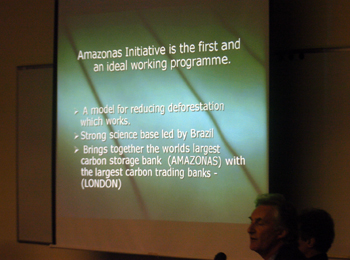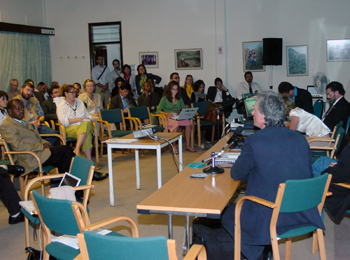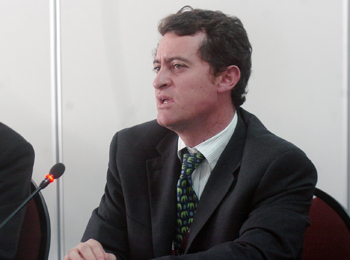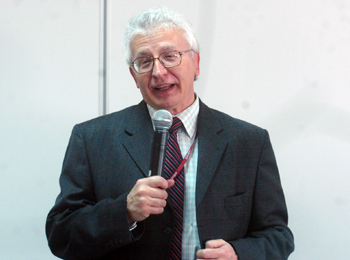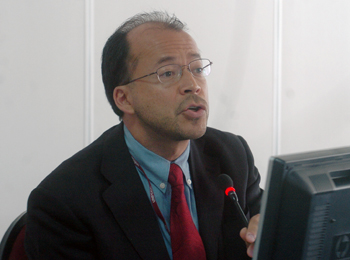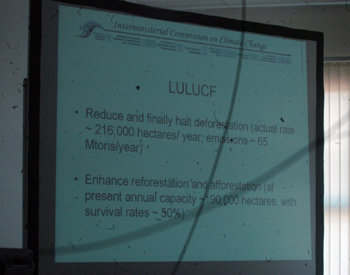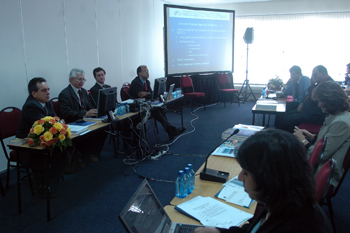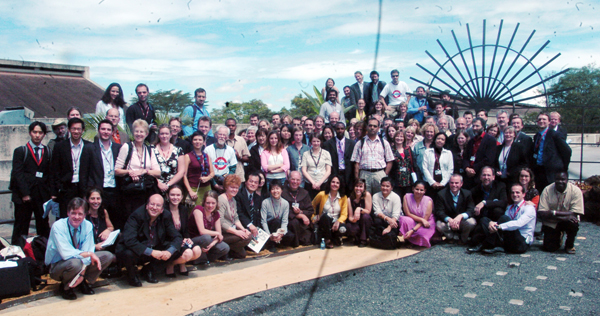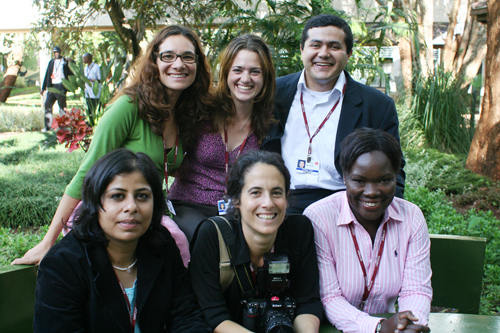 |
||
|
Published by the International Institute for Sustainable Development (IISD)
|
|||
|
A Special Report on Selected Side Events at the Second Conference of the Parties serving as the Meeting of Parties to the Kyoto Protocol (COP/MOP 2) and Twelfth Conference of the Parties (COP 12) to the UN Framework Convention on Climate Change (UNFCCC)
|
|||||
| 6-17 November 2006 | Nairobi, Kenya | |||||
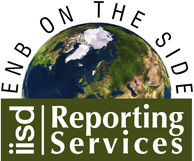 |
|||
 |
|||
Events convened on Friday, 17 November 2006
|
Indigenous peoples experience and concerns on climate change Presented by IAIP |
|||
|
Kittisak Rattanakrajangsri, International Alliance of Indigenous and Tribal Peoples of the Tropical Forests (IAIP), highlighted that indigenous peoples have carefully managed their natural resources in the past and underscored the impact that climate change, as well as decisions made under the UNFCCC negotiations, have on indigenous peoples.
Fiu Mata’ese Elisara-Laulu, O Le Siosiomaga Society, described lessons learned in developing the country’s National Adaptation Programme for Action, emphasizing the importance of pre-synthesis sectoral reports for establishing baseline information and the role of country-wide community consultation in criteria prioritization. He lamented that the five-year programme of work on impacts, vulnerability and adaptation to climate change, adopted by COP 11, focuses on research and not on tangible action. Marcial Arias, Fundación para la Promoción del Conoscimiento Indígena, Panama, described the negative health impacts of sea-level rise on indigenous communities in the coastal regions of Panama. Highlighting lessons learned from adaptation projects, he said: identification of vulnerability should be organized in a bottom-up manner; traditional knowledge regarding climate change should be identified; and more consultations and workshops between indigenous peoples and national governments should be organized. Johnson Cerda, Asociación Indígena de Limoncocha, outlined the conflict that exists between indigenous peoples and oil companies in the Ecuadorian Amazon. He described the work of two organizations that help indigenous communities to map their land use. Cerda explained that the maps help indigenous peoples to demonstrate to the government that they are using their lands, which in turn strengthens their land-use case against the oil companies. Participants discussed the need to recognize and document indigenous knowledge. One participant argued that indigenous peoples will continue to be affected by climate change until use of fossil fuels in the North is reduced. |
|||
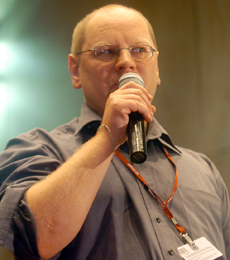 |
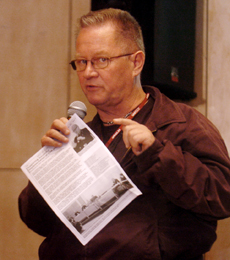 |
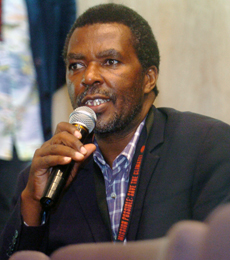 |
|||||
|
Julio Lambing, European Business Council for Sustainable Energy
|
Sandy Gaumtlett, Pacific Indigenous Peoples Environment Coalition
|
Robert Machoria, Society for Protection of Environment in Kenya
|
|||||
|
|||
|
Amazon deforestation and climate change Presented by Amazonas State, Brazil |
|||
|
Virgílio Viana, State Secretary of Amazonas, noted that Amazonia should not repeat Brazil’s mistake regarding the loss of the Atlantic forest. He outlined a Sustainable Development Program to combat deforestation in the Amazonas State, including: tax incentives to forest industries based on sustainable management; payment for environmental services to rubber tappers; establishment of new protected areas; reduction of state taxes on non-timber forest products; technical assistance and financial support for sustainable land uses; and environmental monitoring and punishment for environmental crimes.
Andrew Mitchell, Global Canopy Program, introduced the “biosphere - atmosphere hotspots” concept, which mimics the IUCN biodiversity hot-spot concept for protecting forests through environmental services. He highlighted some of the services provided by canopy ecosystems to humanity, including carbon storage, water storage, temperature buffering and rainfall generation. Underlining the conditions needed to attract capital for payment for ecosystem services, Mitchell presented the VivoCarbon fund that has been expanded to purchase ecosystem services. He reported on the Brazil/London dialogue for developing the necessary framework to implement such a fund. He stressed that the fund will not involve purchasing of land but of environmental services. Adilson Vieira, Amazon Working Group (GTA), explained that GTA is an organization whose membership includes river population, indigenous peoples and others, and that works on creating opportunities for forest communities while protecting the Amazon’s natural resources. Emphasizing that preserving the forest and improving livelihoods are “part of the same story,” Vieira expressed support for the Amazonas Initiative and the Brazilian Federal Government proposal to reduce deforestation and poverty. Noting the dependency of local communities on forests, Vieira said that “what many see as an opportunity to develop businesses, GTA see as a means to survive.” He noted that Brazil’s position in the climate negotiations is maturing but said “there is still room for improvements.” Participants discussed ways to duplicate Amazonas’ work, including the establishment of a network to “maintain momentum” and further engagement in South-South collaboration. Responding to a question on payments for ecosystem services, Viana said Amazonas examined successful experiences in Costa Rica and Colombia that make direct and indirect payments to local communities. |
|||
|
|
|||
|
Third National Communication of Mexico Presented by Mexico |
|||||
|
Fernando Tudela, Deputy Minister of Planning Environment and Policy, Mexico, highlighted Mexico’s climate change agenda, including its Third National Communication, a national climate strategy, an “Interministerial commission on climate change,” a voluntary emissions reporting scheme from the private sector, and a national fund for climate change. Emphasizing the importance of emissions inventories, he noted that Mexico should move forward “step-by-step” and at some point in the future his country can discuss commitments. Tudela highlighted that Mexico is a host country for CDM and aims to expedite unilateral CDM projects. Adrián Fernández, National Institute of Ecology, Mexico, commended the help received from the US Environmental Protection Agency in conducting GHG inventories. He highlighted that vulnerability and adaptation are important concerns and discussed the impacts of climate change. Ramón Ardavin, Under Secretary for Environmental Regulation, Mexico, highlighted Mexico’s GHG reporting initiative and the Mexican carbon fund, which is an initiative between the World Bank and Mexican Export Bank. He added that the fund allows Mexico to realize its market potential for generating GHG credits, especially in the energy sector and programmatic CDM. Participants questioned whether the carbon fund has sectoral guidelines and discussed the institutional arrangements of the national strategy on climate change. |
|||||
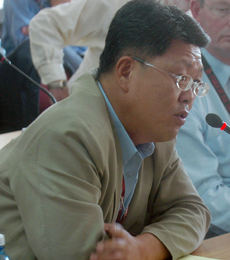 |
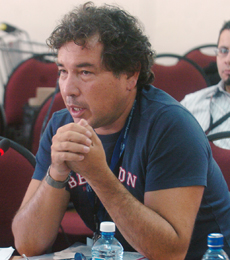 |
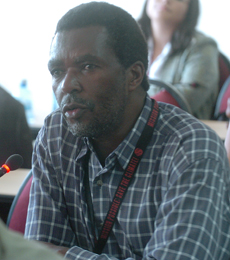 |
|||||
|
Jaekyu Lim, Korea Energy Economics Institution (KEEI)
|
Sergio Jáuregui, UNEP
|
Robert Machoria, Society for Protection of Environment in Kenya
|
|||||
|
|||
|
Around the Side Events |
|||
|
||
|
Click the above button to go back to our ENB main coverage
|
||
|
|
|
|
|
||
|
